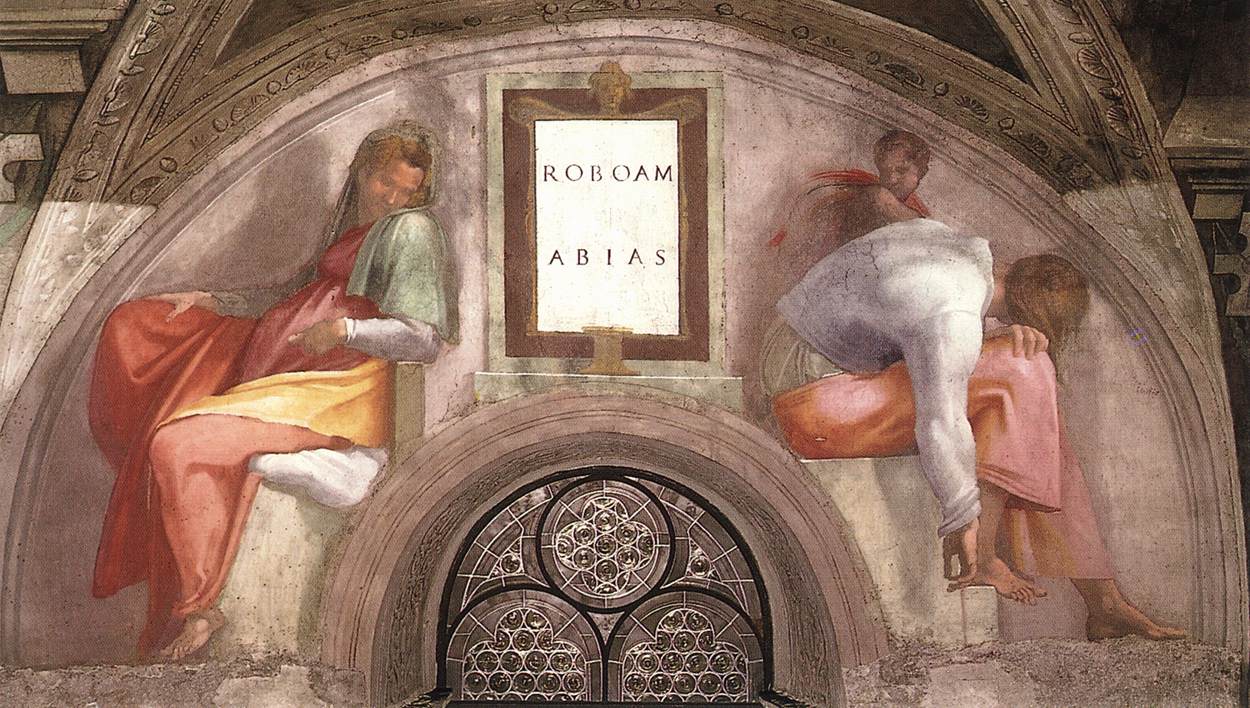 |
| Wikipedia Commons Sistine Chapel Ceiling Michelangelo Roboam Abias |
[6] And Jesse begat David the king; and David the king begat Solomon of her that had been the wife of Urias;
[7] And Solomon begat Roboam; and Roboam begat Abia; and Abia begat Asa;
[8] And Asa begat Josaphat; and Josaphat begat Joram; and Joram begat Ozias
 |
| British Museum Copy after Michelangelo's Sistine Ceiling Abias |
Here is a C.G. Jung quotation available on Wikipedia. It is from Jung's Synchronicity: An Acausal Connecting Principle:
"This grasping of the whole is obviously the aim of science as well, but it is a goal that necessarily lies very far off because science, whenever possible, proceeds experimentally and in all cases statistically. Experiment, however, consists in asking a definite question which excludes as far as possible anything disturbing and irrelevant. *It makes conditions, imposes them on Nature, and in this way forces her to give an answer to a question devised by man. She is prevented from answering out of the fullness of her possibilities since these possibilities are restricted as far as practible.* For this purpose there is created in the laboratory a situation which is artificially restricted to the question which compels Nature to give an unequivocal answer. The workings of Nature in her unrestricted wholeness are completely excluded. If we want to know what these workings are, we need a method of inquiry which imposes the fewest possible conditions, or if possible no conditions at all, and then leave Nature to answer out of her fullness. (Page 35)
Visions of Daughters of Albion, Plate 2, (E 47)
"Why does my Theotormon sit weeping upon the threshold; And Oothoon hovers by his side, perswading him in vain: I cry arise O Theotormon for the village dog Barks at the breaking day. the nightingale has done lamenting. The lark does rustle in the ripe corn, and the Eagle returns From nightly prey, and lifts his golden beak to the pure east; Shaking the dust from his immortal pinions to awake The sun that sleeps too long. Arise my Theotormon I am pure. Because the night is gone that clos'd me in its deadly black. They told me that the night & day were all that I could see; They told me that I had five senses to inclose me up. And they inclos'd my infinite brain into a narrow circle, And sunk my heart into the Abyss, a red round globe hot burning Till all from life I was obliterated and erased. Instead of morn arises a bright shadow, like an eye In the eastern cloud: instead of night a sickly charnel house; That Theotormon hears me not! to him the night and morn Are both alike: a night of sighs, a morning of fresh tears;"
Songs of Experience, SONGS 31, (E 18)"EARTH'S Answer.
Earth rais'd up her head,From the darkness dread & drear.
Her light fled:
Stony dread!
And her locks cover'd with grey despair.
Prison'd on watry shore
Starry jealousy does keep my tent
Cold and hoar
Weeping o'er
I hear the Father of the ancient men
Selfish father of men
Cruel jealous selfish fear
Can delight
Chain'd in night
The virgins of youth and morning bear.
Does spring hide its joy
When buds and blossoms grow?
Does the sower?
Sow by night?
Or the plowman in darkness plow?
Break this heavy chain,
That does freeze my bones around
Selfish! vain!
Eternal bane!
That free Love with bondage bound."
Milton, Plate 41 [48], (E 142)
"To cast off the idiot Questioner who is always questioning,
But never capable of answering; who sits with a sly grin
Silent plotting when to question, like a thief in a cave;
Who publishes doubt & calls it knowledge; whose Science is Despair
Whose pretence to knowledge is Envy, whose whole Science is
To destroy the wisdom of ages to gratify ravenous Envy;"
Jerusalem, Plate 12, (E 155)
"What shall I do! or how exist, divided from Enitharmon?
Yet why despair! I saw the finger of God go forth
Upon my Furnaces, from within the Wheels of Albions Sons:
Fixing their Systems, permanent: by mathematic power
Giving a body to Falshood that it may be cast off for ever.
With Demonstrative Science piercing Apollyon with his own bow!
God is within, & without! he is even in the depths of Hell!
Such were the lamentations of the Labourers in the Furnaces!"
Poetical Sketches, (E 415)
SONG.
"Memory, hither come,
And tune your merry notes;
And, while upon the wind,
Your music floats,
I'll pore upon the stream,
Where sighing lovers dream,
And fish for fancies as they pass
Within the watery glass.
I'll drink of the clear stream,
And hear the linnet's song;
And there I'll lie and dream
The day along:
And, when night comes, I'll go
To places fit for woe;
Walking along the darken'd valley,
With silent Melancholy."
Letters, To Cumberland, (E 706)
"I begin to
Emerge from a Deep pit of Melancholy, Melancholy without any real
reason for it, a Disease which God keep you from & all good men."
No comments:
Post a Comment